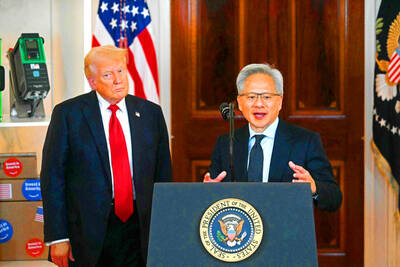Intel Corp, Hon Hai Precision Industry Co (鴻海精密) and Asia Pacific Telecom Co (APT, 亞太電信) yesterday jointly unveiled a multi-access edge computing (MEC) platform and facial recognition technology, the result their collaborative efforts in 5G technology solutions.
“The technologies are applicable to a wide range of scenarios, such as a smarter shopping experience in department stores, smart security for home and companies, smart medical services and more,” Hon Hai business group president and APT chairman Lu Fang-ming (呂芳銘) told a news conference in Taipei.
The MEC platform represents Hon Hai and Intel’s first collaborative work on 5G technology that went public since the two companies inked a memorandum of understanding (MOU) in June last year for the development of network infrastructure on the foundation of 5G connectivity.
Hon Hai participated in the platform’s development with Intel and is in charge of sensor manufacturing for facial recognition technology, while APT provides network connectivity, the companies said.
The MEC is a cloud-based network architecture at the edge of the core network, which brings real-time, high-bandwidth and low-latency access to the network, largely reducing network congestion, Lu said.
The MEC is a solution to data deluge in the 5G environment, because it shares the workload of the core network to process data closer to the users, Lu said.
For example, the platform can prevent network congestion at a stadium during concerts or sports events, he said.
The platform is part of the foundation to build a high-speed 5G connectivity environment, Intel visual cloud division general manager Lynn Comp said.
Facial recognition is one of the applications that can be used on the platform, Lu said, adding that Hon Hai has been using facial recognition with door access control at two of its plants in New Taipei City for one-and-a-half years.
Instead of clocking in and out, more than 200,000 employees at the two plants use facial recognition to report for work and enter the plants, he said.
Facial recognition on the platform can also be used in department stores, Lu said. “For example, facial recognition can instantly provide the customer’s purchase history at the store or alert the sales personnel that the incoming person is a VIP customer.”
APT is in talks with domestic retailers to adopt the platform with facial recognition technology, Lu said.
“We expect to see progress with retailers in the next three to six months,” he said.

Taiwan Semiconductor Manufacturing Co (TSMC, 台積電) last week recorded an increase in the number of shareholders to the highest in almost eight months, despite its share price falling 3.38 percent from the previous week, Taiwan Stock Exchange data released on Saturday showed. As of Friday, TSMC had 1.88 million shareholders, the most since the week of April 25 and an increase of 31,870 from the previous week, the data showed. The number of shareholders jumped despite a drop of NT$50 (US$1.59), or 3.38 percent, in TSMC’s share price from a week earlier to NT$1,430, as investors took profits from their earlier gains

AI TALENT: No financial details were released about the deal, in which top Groq executives, including its CEO, would join Nvidia to help advance the technology Nvidia Corp has agreed to a licensing deal with artificial intelligence (AI) start-up Groq, furthering its investments in companies connected to the AI boom and gaining the right to add a new type of technology to its products. The world’s largest publicly traded company has paid for the right to use Groq’s technology and is to integrate its chip design into future products. Some of the start-up’s executives are leaving to join Nvidia to help with that effort, the companies said. Groq would continue as an independent company with a new chief executive, it said on Wednesday in a post on its Web

CHINA RIVAL: The chips are positioned to compete with Nvidia’s Hopper and Blackwell products and would enable clusters connecting more than 100,000 chips Moore Threads Technology Co (摩爾線程) introduced a new generation of chips aimed at reducing artificial intelligence (AI) developers’ dependence on Nvidia Corp’s hardware, just weeks after pulling off one of the most successful Chinese initial public offerings (IPOs) in years. “These products will significantly enhance world-class computing speed and capabilities that all developers aspire to,” Moore Threads CEO Zhang Jianzhong (張建中), a former Nvidia executive, said on Saturday at a company event in Beijing. “We hope they can meet the needs of more developers in China so that you no longer need to wait for advanced foreign products.” Chinese chipmakers are in

POLICY REVERSAL: The decision to allow sales of Nvidia’s H200 chips to China came after years of tightening controls and has drawn objections among some Republicans US House Republicans are calling for arms-sale-style congressional oversight of artificial intelligence (AI) chip exports as US President Donald Trump’s administration moves to approve licenses for Nvidia Corp to ship its H200 processor to China. US Representative Brian Mast, the Republican chairman of the US House Committee on Foreign Affairs, which oversees export controls, on Friday introduced a bill dubbed the AI Overwatch Act that would require the US Congress to be notified of AI chips sales to adversaries. Any processors equal to or higher in capabilities than Nvidia’s H20 would be subject to oversight, the draft bill says. Lawmakers would have